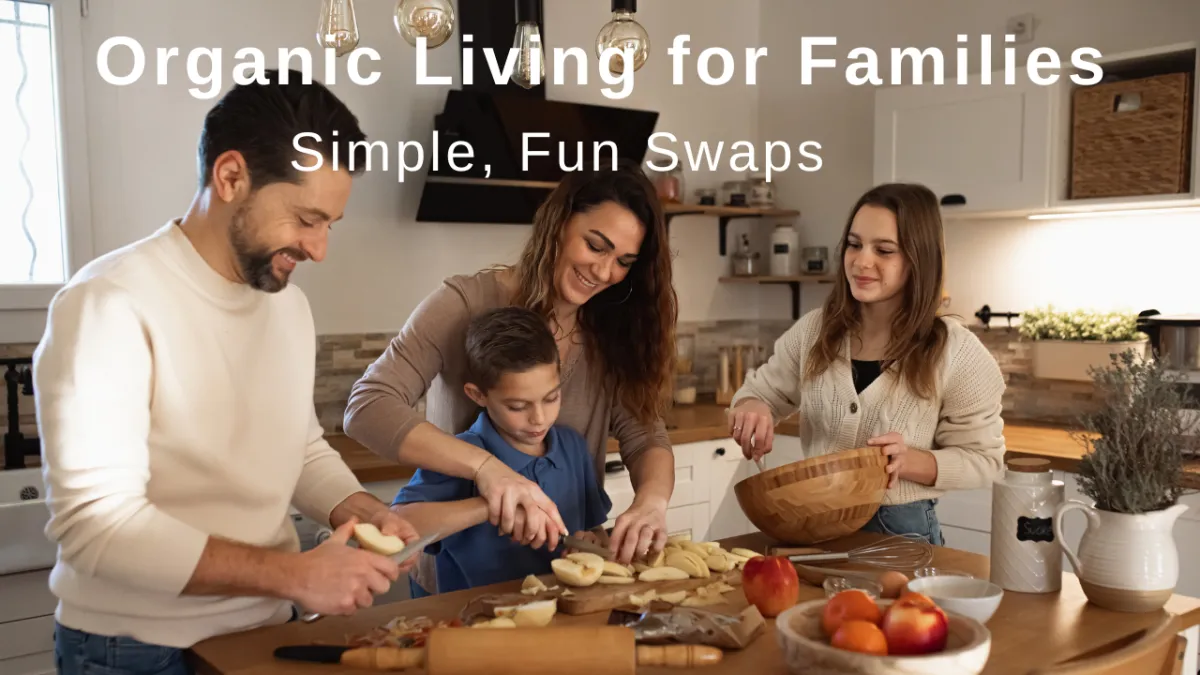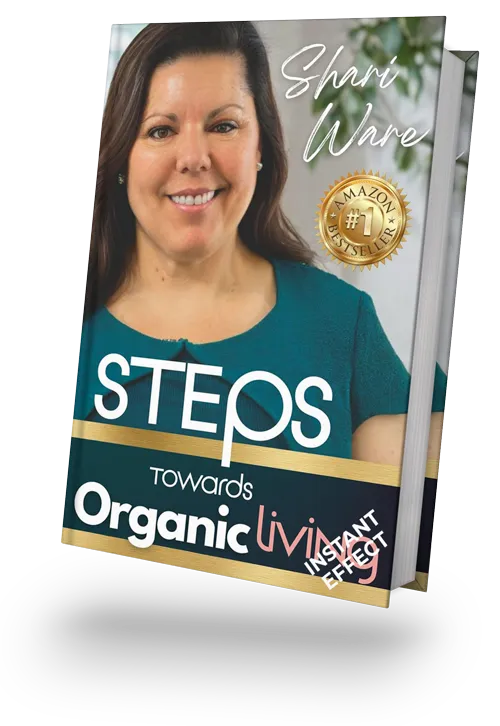Our Blogs
Learn more about how to live your life Organically!

Organic Living for the Whole Family: Simple Swaps Everyone Can Embrace
Why Family Buy-In Matters
Transitioning to a more organic, low-tox lifestyle is powerful when you do it for yourself — but it becomes transformative when your whole family comes on board. That’s because the choices you make for your home ripple outward. The food in the pantry, the products in the bathroom, the cleaning sprays under the sink — they’re used by everyone, not just you. When those swaps support wellbeing, the impact multiplies.
But here’s the catch: families don’t always embrace change easily. Kids can be picky, partners may resist new routines, and budgets often feel tight. Trying to overhaul everything at once can feel overwhelming and sometimes even spark conflict. The truth is, family buy-in is less about perfection and more about patience, positivity, and practicality.
When your kids enjoy the new snacks, when your partner sees that organic swaps can actually save money long-term, and when the home feels calmer and healthier — everyone wins. That’s why family-focused strategies are key. They help ensure your organic journey doesn’t feel like a solo project, but a shared lifestyle that brings you closer together.
In this article, we’ll explore the real challenges families face when moving toward organic living and break down simple, sustainable swaps you can introduce with confidence. By the end, you’ll have a 30-day roadmap for guiding your family step by step — without overwhelm or resistance.
The Challenges of Going Organic as a Family
Making the shift to an organic lifestyle sounds simple in theory — buy better food, swap out toxic products, and create a healthier home. But when you add partners, kids, and family routines into the mix, things can get complicated. It’s not just about your choices anymore — it’s about collective habits, preferences, and priorities.
Here are some of the most common challenges families face:
1. Resistance from Partners
Many partners resist change, especially if they see it as unnecessary, expensive, or inconvenient. They might question why their favourite cleaning spray or processed snack needs to be replaced, especially if they’ve been using it for years.
2. Picky Eaters
Kids are often wary of new foods. If they’re used to brightly packaged snacks or sugary cereals, introducing healthier, organic alternatives can feel like a battle.
3. Budget Constraints
Going organic has a reputation for being expensive, and while it doesn’t have to break the bank, initial swaps can feel like a stretch when feeding a family.
4. Overwhelm for Parents
Mothers often feel like the “gatekeepers” of health in the home, which can add pressure. The idea of overhauling meals, cleaning routines, and personal care all at once can be exhausting.
5. Time Pressures
Busy schedules leave little room for complicated meal prep or DIY cleaning product experiments. If a change feels like more work, it’s unlikely to stick.
The key to overcoming these challenges isn’t to push harder — it’s to start smaller. Focus on the most impactful swaps first, involve your family in the process, and highlight the wins along the way. When your kids notice they actually like the new snack, or your partner sees how much calmer the home feels without synthetic fragrances, resistance begins to melt away.
Organic Swaps for Kids
If there’s one place families notice the biggest difference in going organic, it’s with the kids. Children are more sensitive to toxins, both in food and in the environment, so even small changes can have a huge impact on their behaviour, energy, and overall health. The key is to make swaps feel fun and positive rather than restrictive.
Snacks and School Lunches
Instead of ultra-processed, sugar-loaded snacks, try simple organic alternatives: fruit, popcorn made with coconut oil, or muesli bars with clean ingredients. Swap juice boxes for water bottles or homemade smoothies. Present it as an upgrade — “look what you get to have” — instead of “you can’t have this anymore.”
Bath and Body Products
Kids’ bath time is often filled with colourful soaps and bubble baths that are packed with synthetic fragrances and dyes. Swap these for gentle, fragrance-free organic body washes or handmade soaps. Their skin is their largest organ, and clean products help reduce irritation and support hormone health.
Play Environment
Plastic toys can leach chemicals, especially when mouthed by younger kids. While you don’t need to toss everything, introducing more wooden, stainless steel, or silicone toys creates a healthier balance.
Clothing and Bedding
Pyjamas and sheets are in contact with their skin for hours each night. Switching to organic cotton or bamboo fabrics reduces exposure to pesticides and harsh dyes.
The goal isn’t to create a perfect, toxin-free bubble, but to reduce exposure where it matters most. When kids feel included in the process — picking their own water bottle, choosing a fun soap scent, or helping pack their lunch — they’re more likely to embrace the changes.
Winning Over Your Partner
Getting your partner on board with an organic lifestyle can feel tricky, especially if they’re sceptical about the need for change. But the truth is, resistance usually comes from a mix of habit, convenience, and fear of added expense. The key is to approach the shift with patience, empathy, and plenty of practicality.
Share the Why
Rather than bombarding your partner with statistics, focus on the “why” that matters to your family. Is it protecting your kids’ health? Reducing allergies? Simplifying your routines? When they see the personal benefit, they’re more likely to care.
Lead by Example
Instead of lecturing, start making small swaps yourself and highlight the positive results. For example, mention how much better the house smells without synthetic air fresheners, or how your skin feels softer with a natural body wash. Visible benefits are more convincing than arguments.
Find Budget-Friendly Wins
Partners are often most concerned about cost. Show them how organic swaps can save money long-term — like buying pantry staples in bulk, making simple DIY cleaners, or cutting back on expensive processed snacks.
Include Their Preferences
Ask your partner what matters most to them — maybe it’s their morning coffee, their favourite snack, or their grooming products. Start with swaps they’re open to, instead of forcing the ones they’re resistant to. Small wins build momentum.
Celebrate the Wins Together
When they notice improved energy, fewer household chemicals, or even savings at the checkout, acknowledge it as a shared success. Positive reinforcement makes them feel like part of the journey instead of an outsider being dragged along.
Change is easier when it feels collaborative. By focusing on shared goals and small, visible results, your partner can shift from sceptic to supporter — and eventually become just as invested in an organic family lifestyle as you are.
Household Lifestyle Shifts
Beyond food and personal products, the way your family lives day-to-day has a huge impact on your overall toxic load and sense of wellbeing. Creating an organic lifestyle isn’t about strict rules — it’s about weaving healthier habits into your family’s natural rhythm so they become second nature.
Cleaning Routines
Household cleaning is one of the easiest places to make a difference. Swap out harsh chemical cleaners for simple, multi-use alternatives like vinegar, baking soda, and castile soap. Get your family involved — kids love spraying and wiping when the products are safe. This not only reduces toxins but also makes chores more fun and collaborative.
Shared Mealtimes
Making time to sit down together for meals encourages healthier eating habits and deeper connection. Even if you can only manage a few dinners a week, aim to serve simple, mostly whole foods. Family meals don’t need to be elaborate; what matters is consistency and quality.
Family Self-Care Rituals
Self-care doesn’t have to be solo. Try family walks after dinner, weekend nature outings, or a nightly “screen-free hour” before bed. These rituals strengthen bonds and give everyone a chance to reset together.
Reducing Household Stressors
Clutter, noise, and overstimulation can create invisible stress. Simplifying your home — by decluttering, creating quiet spaces, and reducing background TV or device use — makes the environment calmer for everyone.
Making it Fun
Frame changes as opportunities rather than restrictions. Turn cooking into a family project, create a chore chart with fun rewards, or let kids choose which new snack to try each week. When organic living feels fun, everyone is more likely to engage.
When lifestyle shifts are framed as family values rather than parental rules, they create lasting change. Over time, your home becomes not just a place to live, but a supportive environment where everyone thrives.
Budgeting for Organic as a Family
One of the biggest concerns families have when transitioning to organic living is cost. It’s easy to look at the price tags on organic food or eco-friendly products and feel like it’s out of reach. But the truth is, living organically doesn’t have to break the bank. With smart strategies, you can prioritise the most important swaps and make choices that are both healthier and budget-friendly.
Prioritise High-Impact Swaps
Not everything needs to be replaced at once. Start with the items that your family consumes or uses most often. Think of daily staples like milk, eggs, bread, or snacks for the kids. Focus on the products that make the biggest difference in reducing toxins and improving nutrition.
Shop Smart
Look for farmers’ markets, local co-ops, and bulk-buy options. Often, produce is cheaper when it’s in season and bought directly from growers. Buying pantry staples in larger quantities — like rice, oats, or flour — also cuts costs over time.
Follow the Dirty Dozen and Clean Fifteen
If you can’t buy everything organic, use this guide to prioritise. The Dirty Dozen lists the fruits and vegetables most contaminated with pesticides, while the Clean Fifteen highlights the ones with the least. This helps you focus your spending where it matters most.
Cook More, Process Less
Processed organic snacks can be just as expensive as conventional ones. By preparing simple meals and snacks at home, you save money and gain control over ingredients. Homemade popcorn, oat bars, or veggie sticks are inexpensive and healthy options.
Get the Family Involved
Budgeting becomes easier when everyone plays a part. Encourage kids to help choose produce at the market or let your partner take charge of a budget-friendly recipe. This creates buy-in and makes organic living feel like a family effort instead of a financial burden.
Celebrate Savings, Not Sacrifice
Shift the focus from what you can’t have to what you’re gaining: better health, fewer medical bills in the future, and meals that nourish instead of deplete. Every dollar spent on quality food and products is an investment in your family’s long-term wellbeing.
With the right approach, budgeting for organic becomes less about restriction and more about creativity, resourcefulness, and prioritising what truly matters.
The S.T.E.P.S Formula Applied to Family Living
Making the shift to an organic lifestyle as a family works best when you use the S.T.E.P.S Formula. It takes the pressure off doing everything perfectly and instead focuses on building changes that stick — even in the chaos of family life.
S = Small
Start with one swap per family member. Maybe your child switches to an organic snack, your partner tries a natural deodorant, and you commit to swapping laundry detergent. Small steps make the process manageable and reduce resistance.
T = Timely
Don’t rush to throw everything out at once. Replace items as they run out — snacks at the end of the week, body wash when the bottle is empty, cleaning sprays when they’re finished. This keeps the process affordable and practical.
E = Easy
Choose swaps that fit seamlessly into your current routines. If your family already eats pasta weekly, choose an organic brand rather than introducing an unfamiliar dish. Easy swaps minimise friction.
P = Pleasurable
Make changes enjoyable. Let kids pick out new snacks at the health food store or experiment with fun recipes. Find swaps that feel like treats, not sacrifices. When it feels good, your family is more likely to continue.
S = Sustainable
Focus on what your family can maintain long-term. It’s better to consistently buy organic apples and oats than to attempt an all-organic pantry you can’t sustain. Sustainability is what creates lasting change.
By using the S.T.E.P.S Formula, you create a family approach to organic living that is gradual, joyful, and realistic. Each small shift adds up to a lifestyle that feels doable — not daunting — and benefits everyone in the household.
30-Day Family Organic Living Challenge
Creating change as a family works best when you have a clear, step-by-step plan. This 30-day challenge is designed to keep things simple, fun, and achievable while helping everyone feel included.
Week 1: Kid-Friendly Swap
Introduce one organic swap for your children. Maybe it’s their school snack, bath soap, or a new water bottle to replace juice boxes. Make it fun by letting them help choose the option.
Week 2: Partner-Friendly Swap
Find one swap your partner will appreciate. This could be organic coffee, a natural body wash, or a household product that saves money in the long run. Emphasise the benefit that matters to them.
Week 3: Household Lifestyle Shift
Make one collective change the whole family can do together. Try a family walk after dinner, switching to natural cleaning sprays, or starting a weekly screen-free night. The focus is on connection as well as health.
Week 4: Anchor One New Ritual
Choose a sustainable family ritual that everyone enjoys. This could be a Saturday farmers’ market trip, cooking a simple organic meal together, or creating a bedtime routine with calming teas and story time.
By the end of 30 days, your family will have four meaningful swaps in place, along with a sense of shared accomplishment. These small steps lay the foundation for a long-term organic lifestyle without overwhelm or resistance.
Building an Organic Lifestyle Together
Making the shift to organic living isn’t just about the products on your shelves — it’s about the culture of your home. When every family member feels included, supported, and part of the process, small swaps turn into meaningful lifestyle shifts that last.
The truth is, you don’t need to do it all at once. By focusing on the most impactful changes, using the S.T.E.P.S Formula, and making adjustments that feel fun and sustainable, your family can embrace organic living without the overwhelm. It’s about progress, not perfection.
Imagine a home where the food nourishes, the air feels fresh, and daily routines are simpler and calmer. That’s the gift of choosing organic as a family — you’re not just reducing toxins, you’re creating a safe, supportive environment for everyone to thrive.
If you’re ready to take the next step, the Foundations Program will guide you through the process with simple, practical tools designed for busy families. Inside, you’ll discover how to:
Prioritise swaps that make the biggest difference
Involve your kids and partner without conflict
Create sustainable routines your family will love
👉 Join the Foundations Program here
Your family doesn’t need a perfect plan to live healthier — they just need to start. One swap, one ritual, one step at a time, you’ll be building an organic lifestyle that supports everyone you love.
The S.T.E.P.S Formula: Simplifying Your Organic Journey
Unique Neuroscience-Based Approach
The S.T.E.P.S Formula is a guided, step-by-step method that helps women transition to an organic lifestyle without overwhelm.
Experience benefits like improved health, stress reduction, and financial savings. Expect to achieve smooth, sustainable shifts in your daily life
Feeling overwhelmed by the idea of adopting an organic lifestyle?
We break down the process of organic living into small, actionable steps that fit into your daily routine. By focusing on manageable changes, the S.T.E.P.S Formula allows you to make progress effortlessly, reducing stress while improving your family’s health.
Comprehensive Transformation
Unlike other approaches that demand drastic lifestyle changes, the S.T.E.P.S Formula is designed to meet you where you are. It focuses on ease, sustainability, and affordability, ensuring that organic living is accessible, even for the busiest women.

(Number 1 Best Seller On Amazon, Normally $20.83)
Get in touch with us
Before you enquire, please have a good look through our site. We do our best to answer all questions upfront.
For all other enquiries use the form below and we will get back to you as soon as possible.
0402 867 687
PO Box 139, Oxenford QLD 4210
Got a Question?

Follow Us
Follow Us
© Copyright 2025. EFFORTLESSLY ORGANIC, All rights reserved.

